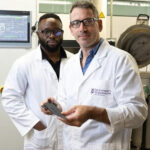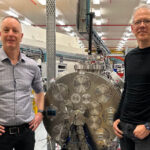With the demand for light satellites and rockets growing and posing new challenges for ultra-lightweight construction, the market study “Materials in lightweight construction for space industry ˮ examines which technologies and materials will make the race to space in the future.
The results will be presented on 10 September at the Lightweight Technologies Forum at COMPOSITES EUROPE in Stuttgart, Germany.
The study shows the current market situation, evaluates the prevailing material technologies and identifies the needs of the space industry. The study was conducted jointly by Automotive Management Consulting (AMC), a consulting firm and lightweight construction expert, and GRADEL, the Luxembourg space supplier.
“From our study, companies can derive the necessary sales directions, market potentials, strengths and weaknesses of technical trends,” says Dr.-Ing. Claus Bayreuther, Head of the study at AMC. “The study makes an objective contribution to the current view and expectations of the entire space market, from the entire supplier pyramid to the end customer,” continues Bayreuther. A total of over 30 companies took part in the study.
Claude Maack, Managing Director of GRADEL, will present the results and potential for the industry for the first time on 10 September at Lightweight Technologies in Stuttgart.
The Lightweight Technologies Forum (LTF) at COMPOSITES EUROPE (10-12 September, Stuttgart, Germany) will demonstrate how lightweight construction can be implemented economically and resource-efficiently. The Forum sees itself as a cross-industry and cross-material think tank.
For more information visit: www.composites-europe.com, www.lite-forum.com













